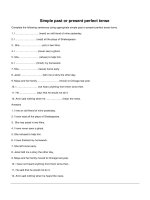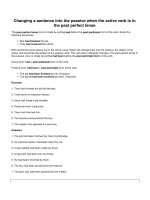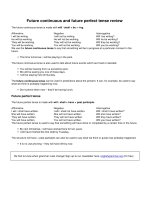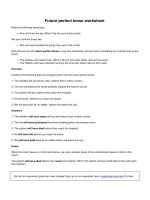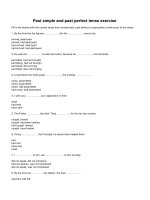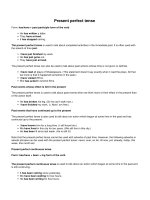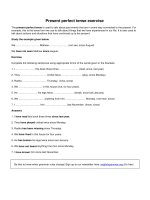Perfect tense and pluperfect tense
Bạn đang xem bản rút gọn của tài liệu. Xem và tải ngay bản đầy đủ của tài liệu tại đây (122.09 KB, 12 trang )
Unit 5 (Unidad 5)
Perfect tense and pluperfect
tense (El [pret
´
erito] perfecto
yelpluscuamperfecto /
antecopret
´
erito [M])
Level 1
1.1 Perfect tense (El [pret
´
erito] perfecto)
1.1 Perfect tense
Haber and the perfect tense (with some reference to tener)
There are two equivalents in Spanish of the English verb to have: haber and tener.They
are not interchangeable. They are both used for the creation of the perfect tense, but
for the moment, in level 1,weshall concentrate on haber. (See also “Irregular Verbs,”
12.1.1.)
The perfect tense in Spanish is made up of the present tense of haber (to have) and
the past participle of the verb in question. This is similar to the English equivalent
construction. The perfect tense in Spanish for verbs ending in -ar is as follows:
1st person He comprado Ihave bought
Sing. 2nd person Has comprado Yo uhave bought
3rd person Ha comprado (S)He has / You have bought
1st person Hemos comprado We have bought
Plur. 2nd person Hab´eis comprado Youhave bought
3rd person Han comprado They/You have bought
-Er and -ir verbs follow a similar, but not identical, pattern:
Comer:
He/has/ha/hemos/hab´eis/han comido I/you/(s)he/you/we/you/they have/has
eaten
Vivir:
He/has, etc., vivido I/you, etc., have/has eaten
Unfortunately, there are a large number of irregular verbs the past participles of which
do not respect this simple pattern. They will be dealt with in level 2.
To a large extent, the use of the perfect tense in Spanish corresponds to the use of the
perfect tense in English. However, there is one important reservation here. In all Spanish
46
5 Perfect tense and pluperfect tense
America, the perfect tense is used much less frequently than in Iberian Spanish. Three
simple examples will illustrate this feature. When you get up in the morning, you would
say in Spain “¿Has dormido bien?” (“Have you slept well?”), but in Mexico the question
would almost certainly be “¿Dormiste bien?” (“Did you sleep well?”). Again, during the
morning, say at eleven o’clock, if a Spaniard asked you what you had done that morning,
(s)he would doubtless say “¿Qu´e has hecho esta ma˜nana?”but in Mexico that question would
be “¿Qu´e hiciste esta ma˜nana?”Athird and final example: after having just eaten a meal,
a Spaniard would probably say “¿Has comido bien?”but a Mexican would doubtless ask
“¿Comiste bien?”Inother words, in Mexico a different tense is used. This tense is called
the past definite or preterit tense, and will be treated in a later chapter (unit 8), so we shall
not concern ourselves any more with it here. It should be pointed out, in consequence,
that the illustrations in this unit will not involve Mexican Spanish, since it would not be
logical or authentic to provide examples with a Mexican flavor.
It may be more helpful, and certainly more logical, to call the perfect tense the
past indefinite tense for one simple reason, and that is the meaning of indefi-
nite. Although the perfect tense refers to the past, it is really the recent past which can
often overflow onto the present moment. In this sense, it is not perfect, or complete,
at all. For instance, it is as though there is business left undone in the sentence: “He
hablado con Juan” (“I have spoken to Juan”). This sentence suggests that there remains
something to add, like “¿Y qu´ehadicho?” (“What has he said / did he say?”), hence the
appropriateness of indefinite.However, the perfect tense in Iberian Spanish stretches
further back in time than in English, which is why you may legitimately and logically
say “He perdido el conocimiento,”but the equivalent English “I have lost consciousness”
has no meaning at all, unless you have a spectacular imagination. Mexican Spanish is
much more like English in this last example, for it too would require a great leap of the
imagination.
The perfect tense is therefore used in the following cases:
i Where an action has begun in the past and continues until the present moment:
He vivido aqu
´
ıvarios a
˜
nos Ihave lived here for a number of years
ii Where an action has been repeated several times and can continue to be repeated:
Lo he le
´
ıdo cuatro veces Ihaveread it four times
iii Where an expected action has still not taken place:
El m
´
edico no ha llegado The doctor has not arrived
iv Where an action has taken place in the very recent past:
Han adivinado la verdad They have guessed the truth
Thefollowing further examples will illustrate the usage of the perfect tense in
Spanish:
He hablado con mi amiga Ihave spoken with my (female) friend
Han llegado tus hermanos Your brothers (and sisters) have arrived
He terminado la lectura del libro Ihave finished reading the book
¿Has aprendido italiano? Have you learnt Italian?
Hemos comido unos pasteles muy ricos We have eaten some very nice cakes
47
ASTUDENT GRAMMAR OF SPANISH
Exercises
Level 1
iWrite in the perfect tense of the verb indicated and use the appropriate form of the
verb haber:
Example
Yo/perder mis llaves > He perdido mis llaves
a(Yo ) aprender espa˜nol f (Ella) pasar un a˜no en Nuevo M´exico
b ¿(T ´u) copiar el informe? g No (´el) llegar todav´ıa
c (Ellos) comer una enorme paella h ¿Qu´e(t´u) comprar hoy?
d (Ellos) jugar al f´utbol esta tarde i (Nosotros) vivir en Puebla
e Llover todo el d´ıa j (Vosotros) meter la carta en el buz´on
ii Answer the following questions. If you are adventurous, you could use the negative
(see unit 26):
a ¿Han llegado tus amigos? f ¿Has encontrado tu cartera?
b ¿Qui´en ha preparado la cena? g ¿Mam´ahaplanchado las camisas?
c ¿Has entendido la pregunta? h ¿Hab´eis comido bien?
d ¿Han vivido en Tejas / Texas (M)? i ¿Ha llovido hoy?
e ¿Has seguido todo el curso? j ¿Has podido terminar tu trabajo?
iii Following the example below, write out the full perfect tense conjugation for each
sentence:
Example
He trabajado todo el d´ıa – has trabajado todo el d´ıa, ha trabajado todo el d´ıa, hemos
trabajado todo el d´ıa, hab´eis trabajado todo el d´ıa, han trabajado todo el d´ıa
aHeempezado el libro hoy d He comido unas tapas
bNohevivido en San Francisco e No he aprendido la lecci´on
cHecorrido en la marat´on f He ido al colegio hoy
iv Paired activity but involving the whole class. Bear in mind that this exercise would
not easily apply to Mexico where the perfect tense is not used very much. This
explains why the vosotros, and not Uds. form is used here (see 17.1.1.).
Objective –Touse the perfect tense with different subject pronouns
Method –Two class members ask each other ten questions, and afterwards the class is
free to ask them both questions
Use words like ¿Cu´ando?/When?, ¿A qu´e hora?/At what time?, ¿Por qu´e?/Why?,
¿C´omo?/How? to introduce your questions. Use verbs like comer, correr, comprar, aprender,
andar, vender, vivir, preparar, seguir, hablar.
Example
PREGUNTA: ¿Qu´e has hecho esta ma˜nana?
RESPUESTA: He trabajado dos horas
Pregunta hecha por la clase (Question asked by the class): ¿Qu´e hab´eis hecho
esta ma˜nana?
Respuesta dada por los otros dos (Answer given by the other two): Hemos
trabajado dos horas
48
5 Perfect tense and pluperfect tense
Level 2
2.1 Passive perfect tense (El pasivo del pret
´
erito perfecto)
2.2 Pluperfect tense (Pluscuamperfecto / antecopret
´
erito (M))
2.3 Note on the past anterior (Nota sobre el pret
´
erito anterior)
2.1 Passive perfect tense
i The perfect tense of the passive is formed, as in English, in the following way:
Haber + past participle of ser + past participle of the verb in question
La venta ha sido aplazada The sale has been postponed
Los coches han sido reparados The cars have been repaired
La comida ha sido preparada The meal has been prepared
El dinero ha sido devuelto The money has been returned
Note that, in these cases, the past participle of the main verb agrees in gender and number
with the subject, as highlighted. If you think about it, the past participle functions like
an adjective which agrees in gender and number. It should be added here that there is a
natural tendency to use the reflexive form of the verb, and not the passive form as above.
(See unit 14 on the reflexive which takes us into deeper water.)
ii The auxiliary verb haber is not separated by another word from the past participle, as
is often the case in French and Italian:
He estudiado muy mal la lecci´on Ihave studied the lesson very badly
Todav´ıa no han llegado They still haven’t arrived
Siempre han sacado buenas notas They have always gotten good marks
Has hecho muy bien tu trabajo You’ve done your work very well
iii When a past participle is used with a verb other than haber, agreement in number
and gender occurs, since it operates like an adjective:
Deja la(s) ventana(s) abierta(s) Leave the window(s) open
He encontrado la caja cerrada Ifound the box locked
Encontr´eala chica escondida Ifound the girl hidden
Dej´elatelevisi´on rota I left the television broken
iv When conjugated with haber, the past participle never agrees with its object:
He escrito la carta Ihave written the letter
Han abandonado la casa They have left/abandoned the house
Hemos alquilado dos coches We’verented two cars
v However, when the verb tener is used with a participle, agreement does occur since
the meaning is not quite the same. Compare these two sentences with haber and
tener:
He escrito la carta Ihave written the letter
Tengo escrita la carta I’ve gotten the letter written
49
ASTUDENT GRAMMAR OF SPANISH
Similarly:
Han abandonado la casa Hemos alquilado dos coches
Tienen abandonada la casa Tenemos alquilados dos coches
When tener is used, the past participle operates like an adjective, agreeing with the
noun.
vi Past participle used as a noun. This is a very common practice, not only in Spanish
but also in French and Italian. English has few equivalents to this phenomenon. The
nouns in these cases may often be found in the plural. Below is a short list:
accidentado(s) the injured (in an accident)
acusado(s) the accused
consultado(s) those who were / have been consulted
convocado(s) those who were / have been called
encuestado(s) those questioned (for a survey)
entrevistado(s) those who were / have been interviewed
excluido(s) those excluded
herido(s) the wounded
inscrito(s) those who were / have been registered
jubilado(s) the retired
marginado(s) those who were / have been excluded
privilegiado(s) the privileged
rescatado(s) those rescued
It goes without saying that, if these past participles / nouns were in the singular, the
translation might be “the one who was / had been / has been,” etc. What is certain is
that English cannot very easily accommodate this phenomenon.
2.2 Pluperfect tense
The imperfect of haber with the past participle forms the pluperfect tense. It is equivalent
to the English had done/spoken/walked, etc. It represents an action or event not only past
but occurring before another past event. The usage is thus the same in both languages:
Me dijo que Armando se hab´ıa ido She told me that Armando had gone away
Pens´abamos que el ni˜no se hab´ıa acostado We thought the child had gone to bed
Me di cuenta de que hab´ıan cambiado el dinero Irealized they had changed the money
2.3 Note on the past anterior
This is a literary tense, little used in current speech and general writing or newspapers, for
instance, although it does appear in narrative writing, novels and so on. You will probably
not need to use it but it is useful to recognize it. It has the same use and meaning as the
pluperfect.
It is preceded by such conjunctions as
apenas hardly no bien no sooner
cuando when tan pronto como as soon as
50

